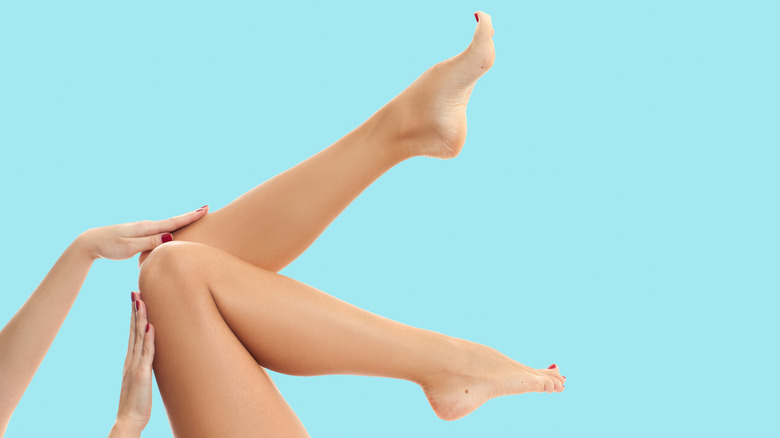The List's Exclusive Survey Shows The Most Common Method For Hair Removal
Have you ever been in the shower so long that the hot water runs out? Your fingers get all pruny and you realize you can't see through all the steam? That extra long shower is usually thanks to your added hair removal routine. Don't worry, we totally get it.
Per Healthline, a recent study reported that nearly 75% of women and 50% of men regularly groom their pubic region and surrounding areas. That same study found that 20% of women groom for their partner's preference rather than their own, with the hopes of being considered desirable. According to researchers at The Smithsonian, hair removal has been marketed to us for over a century as a way to "create and reinforce identity and gender norms within American cultures." Companies rely on people's desire to be perceived as attractive to sell their hair removal products. Good news for those of us who think shaving is a huge hassle: hair removal is not a necessity, and is most likely a part of your routine because advertisers told you to.
But many people enjoy emerging from their lengthy showers with smooth, hairless legs and pits. For those that practice removing body hair, there are so many methods to choose from. Do we book monthly waxing sessions, or should we brave it ourselves with a pair of tweezers and a mirror? To find out which method of hair removal is most popular, The List conducted a survey asking 600 people, "What is your go-to method for hair removal?"
This popular hair removal method has been around for centuries
According to The List's survey, the most popular method of hair removal is shaving. Unsurprisingly, shaving received 72.33% of the vote, a widely popular way for people to easily remove their hair from the comfort of their bathroom. Shaving is so common that companies have created razor subscription services that provide you with fresh razors each month; if you have been using the same old rusted three-blade razor for months because you keep forgetting to grab a new one at the store, we highly suggest trying it out.
In second place with 13.17% is waxing. This hair removal method takes more time and setup, but the results last longer than shaving and can help avoid razor burns. The American Academy of Dermatology warns of the many precautions you should take before doing an at-home wax, and highly suggests visiting a professional for bikini waxes.
Laser hair removal and depilatory creams like Nair tied with 5.5% of the vote. Laser is a longer and more expensive method than applying topical hair removal creams, but the results are seriously long lasting. Threading (2.33%) and sugaring (1.17%) are two more alternative hair removal methods that are less popular, but a great alternative to traditional razors.
If you're suffering from constant ingrown hairs or razor burn, you may be using the wrong method of hair removal. Consider checking out these shaving mistakes you never knew you were making.
If you don't like shaving, you can blame the beauty industry
Men have been shaving since the dawn of time: Almanac reports that "ancient cave drawings [depicted] men without beards," implying that facial hair was removed with sharp, tweezer-like objects as early as 30,000 BC, and the first razors were found in Egypt around 3,000 BC. But a vast majority of women did not practice removing their body hair until 1915.
As skirts got shorter and looser, marketing agencies saw a chance to convince women that they needed to be hair-free in certain areas to be considered "hygienic." However, this logic wasn't based in any science, it was based on consumerism. According to Bustle, King Camp Gillette, father of the razor you know today, saw an opportunity to double his razor sales, and began running ads that encouraged women to shave their legs and armpits. Vox reports that by the 1950s, a hairless woman was "the norm," as women fell under the pressure of advertisements and evolving fashion trends.
If you find yourself debating on whether or not you should stop shaving, remember that you don't have to. Wherever your hair grows is a completely natural part of your body that does not need to be removed for you to be considered "clean." Only practice hair removal if it makes you feel more comfortable, and not because some dude named Gillette told you to.


